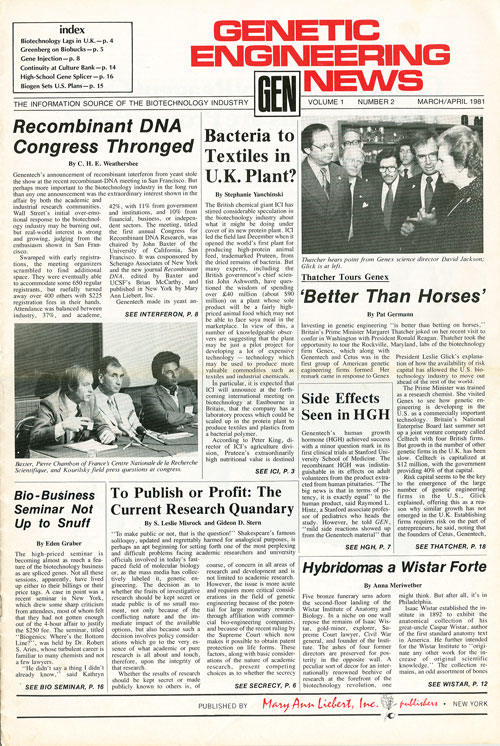May 15, 2011 (Vol. 31, No. 10)
Editor’s Note
During the early days of the biotechnology industry, there were several bellwether companies that analysts and other industry observers kept an eye on to get a sense of the biobusiness world’s health and potential. Genentech, Amgen, Cetus, Centocor, and Genzyme immediately spring to mind, as does Biogen (now Biogen Idec). All six of these companies, and each in their own way, provide excellent examples of R&D startups that ran the gamut of financial, regulatory, and scientific obstacles over a number of years before becoming successful biotech firms.
In this issue of GEN, we are publishing a story from the March/April 1981 issue of GEN in which former Boston Globe business reporter Ronald Rosenberg talks about Biogen’s plans to renovate lab facilities for occupation in East Cambridge, MA, for the fall of 1981. The article discusses Biogen’s early investors, including Monsanto, Inco, and Schering Plough, and the involvement of MIT professors Phil Sharp and Danny Wang in the company. Rosenberg’s story also makes note of Harvard scientist Wally Gilbert’s role on the supervisory scientific board.
The article also looks at Biogen’s product development plans and the company’s ongoing dialogue with the local community that had expressed concerns over the safety of recombinant DNA technology. Today, Biogen is known for its key products Tysabri® and Avonex® for multiple sclerosis. In short, Rosenberg’s Biogen article offers us a snapshot of a time long ago and describes the pioneering efforts and evolution of one of the world’s premier biotech companies.
—John Sterling, Editor in Chief
“As Seen in GEN—Flashback” Volume 1, No. 2, March/April 1981
U.S. Biogen Operations Set for Fall
By Ronald Rosenberg
Biogen Inc. is expecting to get the green light early this month to operate a research and manufacturing facility under a revised Cambridge, Mass. safety ordinance. However, the company does not expect to begin research and development activities until this fall. While the company awaits approval, it has begun renovation of a two-story, 25,000-square-foot facility in East Cambridge. The firm expects the labs will be ready for occupancy by September or October, according to Robert Fildes, president of Biogen, Inc., the U.S. subsidiary of the international genetic engineering company now based in the Netherlands Antilles. Biogen is also the parent company of Biogen S.A. of Geneva, which is developing and producing interferon in small quantities.
The U.S. facility is part of a $4.5 million capital investment this year, Fildes said. “We expect by the mid-1980s to be a profitable organization, one that will be in full production as well as continuing research and development,” he said. For its first American operations, Biogen will be heavily involved in industrial DNA research and development, due mainly to its corporate investors—Monsanto Company, Inco Ltd., and Schering-Plough Corp.
Fildes declined to disclose the nature of the company’s plans for Monsanto, except to state they would be industrial chemicals. Biogen continues supporting human-protein studies by Harvard University biologist Walter Gilbert, who is on the company’s supervisory scientific board. The company is supporting the work of Philip Sharp, MIT professor of molecular biology, and it will aid MIT biochemist Daniel Wang, both of whom are also on the scientific advisory board.
We are beginning to realize more opportunities in the commercial area than we initially expected, and we are looking to expand our research and development budget,” Fildes noted. “We are seeing potential agricultural products—the type that can resist crop diseases.”
Currently under negotiation are the following plans:
• Production of ethanol from cornstover for an undisclosed U.S. manufacturer, under a license agreement.
• Development of food additives by fermentation for an American food company.
• Undertaking food and chemical research independent of other contracts.
Currently the company is operating out of temporary facilities in Harvard Square, and has begun staffing up. Biogen has plans to hire 40 people—half of them with doctoral degrees, Fildes said. These will include microbiologists, chemists, and other research scientists.
“We have had an enthusiastic response from the [Boston-Cambridge] community for positions,” said Fildes. By the end of 1982, he said Biogen expects to double its staff, to as many as 80 or 90 people.
For all of its ambitious plans, however, the company must first get required City of Cambridge approvals. Fildes said he is progressing well with needed permission from Cambridge City Council. Involved in the decision is Councilman Alfred E. Vellucci, a long-time opponent of unregulated DNA research. Barely 5 years ago, Vellucci led a drive to ban all genetic research in the city when it was proposed at Harvard University and MIT. Biogen has been working with Cambridge’s Experimental Review Board and the Biohazards Committee to draw up specifications for its P-1 and P-2 containment facility.
Biogen began traveling the city approval road last October. During the first round of public hearings, the city council named a committee of citizens and experts to study the existing ordinance and submit possible changes.
Fildes said these changes would require Biogen to establish internal operating controls including controls on the use of its fermentation system. In addition there are certain auditing and monitoring guidelines, as well as a continuation of all National Institutes of Health guidelines.
Biogen’s plans include a 1,000-liter fermenter to produce small quantities of bacterial strains for animal tests and for selected customers. “There are no plans for broad-scale production,” Fildes stressed.
Meanwhile, the city of Somerville, which adjoins Cambridge, has set up a schedule of public health and safety hearings on a proposed DNA regulation that it hopes will become law this spring. However, the hearings may be academic. The company intended to fall under the regulation has withdrawn its building-permit application. On January 22, Genetics Institute, Inc., whose scientific advisor is Mark Ptashne, chairman of the molecular biology department at Harvard, withdrew the application when it failed to get a building permit from the city.




